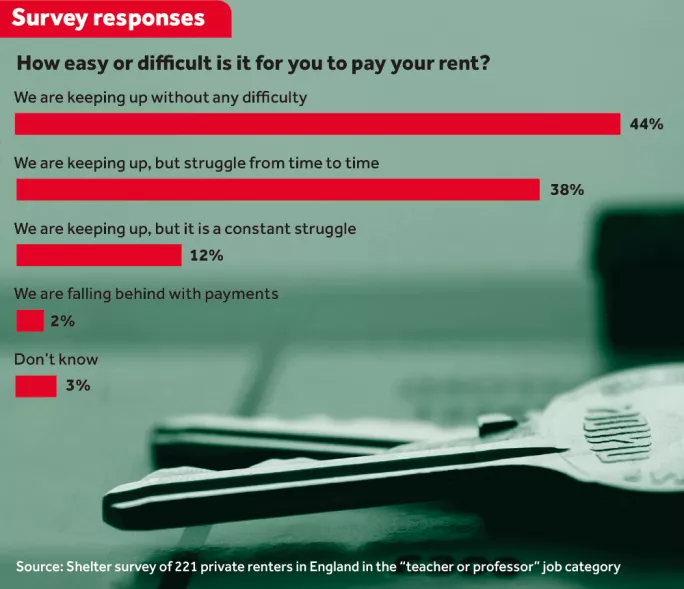Homeless teachers: education’s next crisis?

Chancellor Philip Hammond promised, in last week’s Budget speech, to ensure “the dream of home ownership is a reality for all generations” and to build a country “that cares for the vulnerable and nurtures the talented”.
But not only is home ownership increasingly out of reach for many teachers, a growing number are also on the verge of homelessness, a Tes investigation reveals.
As well as causing hardship for teachers, unaffordable housing is also playing into one of the biggest problems currently facing the school system - the crisis in teacher recruitment and retention.
The situation has become so serious that senior figures in politics and education are now pressing the government to intervene to secure affordable housing for teachers.
According to figures shared with Tes by the Education Support Partnership (ESP), a charity that provides mental health and wellbeing support to education staff in the UK, the number of teachers it has helped who are threatened by homelessness is on track to more than double this year.
Last year, the charity helped 300 people experiencing a financial crisis relating to housing. Halfway through this financial year, the figure had already reached 350. “We’ve seen a real surge in teachers applying to our grants scheme in the major cities and areas where pressure on housing and living costs are high,” an ESP spokeswoman says.
One of those helped by the charity is Tara, a teacher in Bath. A single mother, she faced the prospect of homelessness earlier this year when her landlord terminated her tenancy.

Tom, a primary teacher who lives in Leyton, East London, was also helped by the ESP. A single parent with two children aged 6 and 9, he found that no matter how much he budgeted, his basic outgoings outstripped his pay.
He received a grant towards his rent and council tax earlier this year when he was on the verge of going into arrears. He estimates that 80 per cent of his pay is swallowed up by the £1,250 monthly rent, which pays for what he describes as a “pretty grotty two-bed flat”.
The increasing unaffordability of housing for many teachers is believed to be the result of two factors: soaring house prices in some parts of the country, combined with seven years of public sector pay restraint.
Teachers left behind
In London, the average house price in November 2010 stood at £282,290. Fast forward to September 2017 and the average price in the capital was an astonishing £483,568.
Teacher salaries have been left behind by this meteoric rise. In 2010, a teacher working in an Inner London school was entitled to a minimum salary of £27,000 on the main pay scale.
While the average London house increased by more than £200,000 during the next seven years, the minimum point on the main pay scale for Inner London teachers rose by just £1,660, to £28,660 in the 2017-18 pay award.
However, the problem is not confined to the capital. As Tara’s experience shows, teachers working in schools across the south of England are struggling with the cost of housing.
Sian Carr, executive principal of The Skinner’s Kent Academy in Tunbridge Wells and a past president of the Association of School and College Leaders, says that house prices in her part of Kent are “not that dissimilar” to the capital. However, teachers in Tunbridge Wells are ineligible for the pay top-ups.
Layla Moran MP, the Liberal Democrat education spokesperson, says that her constituency of Oxford West and Abingdon has “some of the highest ratios of affordability to income in the country”.
Local house prices are so high that she says she is aware of teachers who have “left schools in Oxford to go to work in London” to benefit from the extra pay.
While most teachers will not be threatened by homelessness, many appear to be struggling with rising housing costs. According to a survey of private renters by the housing charity Shelter, 52 per cent of teachers report difficulty keeping up with rent payments at least “from time to time”.
And this is feared to be fuelling the crisis in recruitment and retention. Survey findings published last week by the NAHT headteachers’ union found that “high housing and living costs” was the third most common factor cited by school leaders as to why they struggle to recruit NQTs.
This year, nearly a third (32 per cent) of respondents mentioned this factor, compared with just under a quarter (24 per cent) in 2014.
Moran has experienced the problem first hand as a governor of an Oxford primary. Housing is one of the biggest reasons that her school is losing teachers, she says. It also adds “massively to teacher workload and stress”, because those who choose to stay are forced to live “really far away” to afford a house.
Department for Education figures published in May revealed that almost half of London teachers moved to a different region in the four years up to 2014. The Social Mobility Commission, in a report published this week, says this is “probably because of the cost of housing”. In contrast, only one in 10 teachers in the North East moved out of the region during that period.
While the government outlined policies in the Budget to help people get onto the property ladder, there is nothing to suggest that struggling teachers will receive relief anytime soon. And the Office for Budget Responsibility has predicted that the decision to abolish stamp duty for first-time buyers will actually cause house prices to rise - although Hammond has disputed this.
The DfE points to measures being taken to ease teacher recruitment problems. A spokesperson says: “We continue to invest significant sums in teacher recruitment with £1.3 billion up to 2020 being invested in teacher bursaries to attract the best and brightest into the profession.”
You need a Tes subscription to read this article
Subscribe now to read this article and get other subscriber-only content:
- Unlimited access to all Tes magazine content
- Exclusive subscriber-only stories
- Award-winning email newsletters
Already a subscriber? Log in
You need a subscription to read this article
Subscribe now to read this article and get other subscriber-only content, including:
- Unlimited access to all Tes magazine content
- Exclusive subscriber-only stories
- Award-winning email newsletters